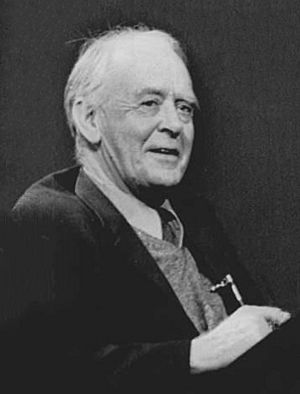John Hicks facts for kids
Quick facts for kids
Sir John Hicks
|
|
|---|---|

Hicks in 1972
|
|
| Born |
John Richard Hicks
8 April 1904 Warwick, England, UK
|
| Died | 20 May 1989 (aged 85) Blockley, England, UK
|
| Institution | Gonville and Caius College, Cambridge London School of Economics University of Manchester Nuffield College, Oxford |
| School or tradition |
Neo-Keynesian economics |
| Alma mater | Balliol College, Oxford |
| Influences | Léon Walras, Friedrich Hayek, Lionel Robbins, Erik Lindahl, John Maynard Keynes |
| Contributions | IS–LM model Capital theory, consumer theory, general equilibrium theory, welfare theory, induced innovation |
| Awards | Nobel Memorial Prize in Economic Sciences (1972) |
| Information at IDEAS / RePEc | |
Sir John Richards Hicks (8 April 1904 – 20 May 1989) was a British economist. He is considered one of the most important and influential economists of the twentieth century. The most familiar of his many contributions in the field of economics were his statement of consumer demand theory in microeconomics, and the IS–LM model (1937), which summarised a Keynesian view of macroeconomics. His book Value and Capital (1939) significantly extended general-equilibrium and value theory. The compensated demand function is named the Hicksian demand function in memory of him.
In 1972 he received the Nobel Memorial Prize in Economic Sciences (jointly) for his pioneering contributions to general equilibrium theory and welfare theory.
Early life
Hicks was born in 1904 in Warwick, England, and was the son of Dorothy Catherine (Stephens) and Edward Hicks, a journalist at a local newspaper.
He was educated at Clifton College (1917–1922) and at Balliol College, Oxford (1922–1926), and was financed by mathematical scholarships. During his school days and in his first year at Oxford, he specialised in mathematics but also had interests in literature and history. In 1923, he moved to Philosophy, Politics and Economics, the "new school" that was just being started at Oxford. He graduated with second-class honors and, as he stated, "no adequate qualification in any of the subjects" that he had studied.
Career
From 1926 to 1935, Hicks lectured at the London School of Economics and Political Science. He started as a labour economist and did descriptive work on industrial relations but gradually, he moved over to the analytical side, where his mathematics background returned to the fore. Hicks's influences included Lionel Robbins and such associates as Friedrich von Hayek, R.G.D. Allen, Nicholas Kaldor, Abba Lerner and Ursula Webb, the last of whom, in 1935, became his wife.
From 1935 to 1938, he lectured at Cambridge where he was also a fellow of Gonville & Caius College. He was occupied mainly in writing Value and Capital, which was based on his earlier work in London. From 1938 to 1946, he was Professor at the University of Manchester. There, he did his main work on welfare economics, with its application to social accounting.
In 1946, he returned to Oxford, first as a research fellow of Nuffield College (1946–1952) then as Drummond Professor of Political Economy (1952–1965) and finally as a research fellow of All Souls College (1965–1971), where he continued writing after his retirement.
Later life
Hicks was knighted in 1964 and became an honorary fellow of Linacre College. He was co-recipient of the Nobel Prize in Economic Sciences (with Kenneth J. Arrow) in 1972. He donated the Nobel Prize to the London School of Economics and Political Science's Library Appeal in 1973. He died on 20 May 1989 at his home in the Cotswold village of Blockley.
See also
 In Spanish: John Hicks para niños
In Spanish: John Hicks para niños
- Hicksian demand function
- Hicks optimality
- Hicks-neutral technical change
- List of economists
- Nobel Prize in Economics
Selected publications
- 1932, 2nd ed., 1963. The Theory of Wages. London, Macmillan.
- 1934. "A Reconsideration of the Theory of Value," with R. G. D. Allen, Economica.
- 1937. "Mr. Keynes and the Classics: A Suggested Interpretation," Econometrica.
- 1939. "The Foundations of Welfare Economics", Economic Journal.
- 1939, 2nd ed. 1946. Value and Capital. Oxford: Clarendon Press.
- 1940. "The Valuation of Social Income," Economica, 7:105–24.
- 1941. "The Rehabilitation of Consumers' Surplus," Review of Economic Studies.
- 1942. The Social Framework: An Introduction to Economics.
- 1950. A Contribution to the Theory of the Trade Cycle. Oxford: Clarendon Press.
- 1956. A Revision of Demand Theory. Oxford: Clarendon Press.
- 1958. "The Measurement of Real Income," Oxford Economic Papers.
- 1959. Essays in World Economics. Oxford: Clarendon Press.
- 1961. "Measurement of Capital in Relation to the Measurement of Other Economic Aggregates", in Lutz and Hague, editors, Theory of Capital.
- 1965. Capital and Growth. Oxford: Clarendon Press.
- 1969. A Theory of Economic History. Oxford: Clarendon Press. Scroll to chapter-preview links.
- 1970. "Review of Friedman", Economic Journal.
- 1973. "The Mainspring of Economic Growth", Nobel Lectures, Economics 1969–1980, Editor Assar Lindbeck, World Scientific Publishing Co., Singapore, 1992.
- 1973. Autobiography for Nobel Prize
- 1973. Capital and Time: A Neo-Austrian Theory. Oxford, Clarendon Press.
- 1974. "Capital Controversies: Ancient and Modern", American Economic Review.
- 1974. The Crisis in Keynesian Economics. New York, Basic Books.
- 1975. "What Is Wrong with Monetarism", Lloyds Bank Review.
- 1977. Economic Perspectives. Oxford: Clarendon Press.
- 1979. "The Formation of an Economist." Banca Nazionale del Lavoro Quarterly Review, no. 130 (September 1979): 195–204.
- 1979. Causality in Economics. Oxford: Basil Blackwell.
- 1980. "IS-LM: An Explanation," Journal of Post Keynesian Economics.
- 1981. Wealth and Welfare: Vol I. of Collected Essays in Economic Theory. Oxford: Basil Blackwell.
- 1982. Money, Interest and Wages: Vol. II of Collected Essays in Economic Theory. Oxford: Basil Blackwell.
- 1983. Classics and Moderns: Vol. III of Collected Essays in Economic Theory. Oxford: Basil Blackwell.
- 1989. A Market Theory of Money. Oxford University Press.

